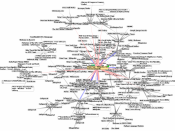Although information architecture may seem to be a high-handed and daunting term, it's really nothing new or mysterious. From clay-tablet scribes to medieval monks to the folks who organize your daily newspaper, information architects have contributed in subtle but important ways to our world. Information architects have balanced the whims of authority with those of unforgiving users of every stripe, while forcibly fitting their efforts into the constraints of the available information technologies. In many cases, information architects have been responsible for major advancements in those technologies.
The World Wide Web is the latest advancement in information technology, and, as with the previous innovations, certain principles carry over and others must be completely reexamined and overhauled. Because the Web integrates so many technologies and content types into a single interface, it challenges designers of the web sites and intranets greatly.
The book states that truly successful web sites, especially large and complex ones, demand the expertise of professionals from many different disciplines.
Besides information architects, great sites also require the skills of programmers, graphic designers, technical specialists, marketers, copywriters, project managers, and others. The book concentrates on the skills needed for information architecture.
Information architects have two major influences:
÷Their professional backgrounds in the field of information and library studies.
÷Their experience in creating information architectures for large, complex web sites, primarily for corporate clients
Many librarians have responded slowly to new information technologies like the Web. Some librarians feel that their value as professionals will be diminished as "virtual libraries" supplant those filled with physical books and periodicals. Many librarians fear that the public will bypass them and go directly to the source via the Internet. The trust is, however, that skills in information organization and access are more and more necessary in this era of information...



Report on Information Architecture based on the text: Rosenfeld, L & Morville, P. (1997).
I feel like i need to develop a site and become an Information Architect. A great piece of work. i am studying to be an IT Adult teacher i will show this to my future classes - hopefully it will inspire them.
2 out of 2 people found this comment useful.